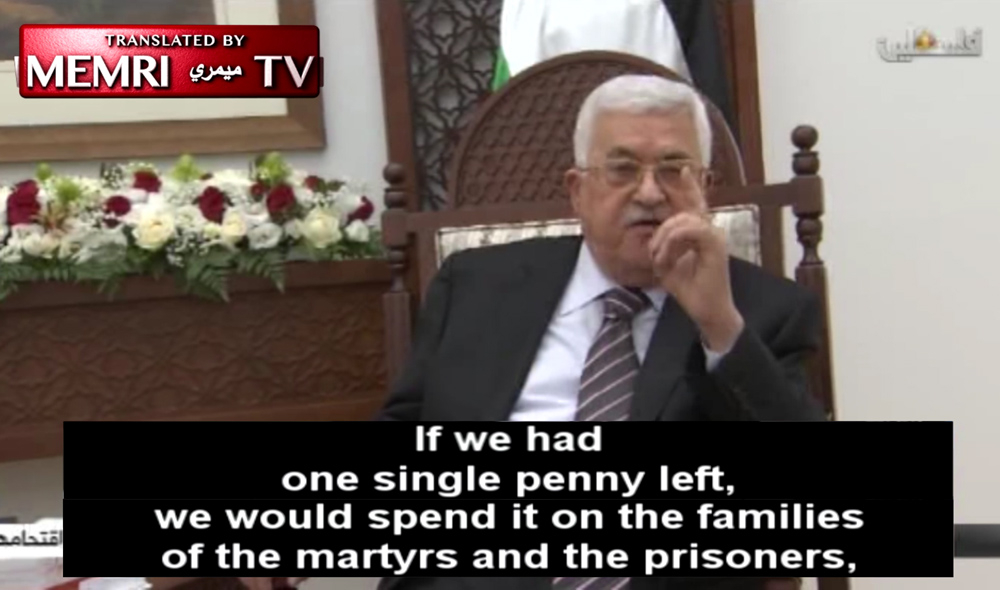Blood money: The PA's terrorist reward system
The Palestinian Authority's Martyr's Fund, dubbed Pay for Slay, is an initiative that provides financial incentives to the families of Palestinian terrorists who commit acts of violence against Israeli civilians.
Israel Hayom
Aug 22, 2024

The Palestinian Authority (PA) has developed a controversial program known as the "Martyr's Fund," which is widely recognized as "Pay to Slay." This initiative provides financial incentives to the families of Palestinian terrorists who commit acts of violence against Israeli civilians.
The origins of the Martyr's Fund
To understand the Martyr's Fund, we must first look back at the roots of the Palestinian Liberation Organization (PLO), established in the 1960s. The PLO aimed to represent the Palestinian people, but it also incentivized attacks against Israel. During this time, the PLO created a system to support families of those who engaged in violent acts against Israelis. This system was a twisted adaptation of social security, ensuring that families would not face financial ruin if their primary earners were killed or imprisoned while committing acts of terrorism. It was a financial safety net for those willing to engage in these activities.
PA governance and funding
The PA was established as part of the Oslo Accords, intended to create a framework for peace and governance for Palestinians. However, the PA's governance has been marred by corruption and reliance on foreign aid. Countries worldwide began donating millions to the PA, expecting it to establish order and provide essential services. Instead, a portion of this budget was redirected to the Martyr's Fund.
The PA's decision to allocate funds for the Martyr's Fund raises critical ethical questions. Instead of focusing solely on infrastructure, security, and welfare, the PA opted to continue the PLO's legacy of incentivizing violence. This decision has drawn widespread condemnation, particularly from Israel and many Western nations.
The structure of the Martyr's Fund
The Martyr's Fund operates under a legal framework established by the PA. Payments are guaranteed under the Prisoners and Released Prisoners Law, which outlines benefits for individuals imprisoned for acts of terrorism. These benefits include monthly payments, educational assistance, health insurance, and even guaranteed government jobs upon release. The more Israelis killed and the longer jail time, the better the reward. This system creates a perverse incentive structure that rewards violent acts against civilians.
Impact of the Second Intifada
The Second Intifada, which erupted in late 2000, marked a significant escalation in violence. During this period, the PA dramatically increased its financial support for those engaged in terrorist activities. Reports indicate that between 2002 and 2004, the PA allocated around $25 million, a 500 percent increase, annually to individuals involved in attacks against Israelis. This illustrated the PA's commitment to funding violence even while engaged in peace negotiations.
Israeli responses to the Martyr's Fund
In response to the ongoing violence and the PA's funding of terrorism, Israel has implemented various measures aimed at disincentivizing these acts. These measures include demolishing the homes of terrorists, imposing restrictions on movement, and establishing security checkpoints. However, critics argue that these actions often unfairly punish the families of terrorists who did not commit any crimes themselves.
Despite these efforts, the effectiveness of Israel's deterrent strategies has been limited. The PA has shown a remarkable ability to adapt and find ways to continue funding the Martyr's Fund despite international pressure.
The Taylor Force Act
International aid to the PA has been a contentious issue, particularly following the Taylor Force Act, which was enacted in response to a violent attack that resulted in the death of Taylor Force, an American serviceman who happened to be in Israel. This act froze US financial aid to the PA until it ceased its payments to terrorists. Other countries followed suit, implementing similar restrictions on aid to the PA.
However, the PA has managed to exploit loopholes, designating these payments as social welfare rather than direct support for terrorism. This manipulation of language and intent has allowed the PA to continue its funding practices despite international condemnation.
The resumption of US aid
In 2021, the US resumed its financial aid to the PA, allocating significant funds for humanitarian assistance in the West Bank and Gaza. While a portion of this aid is intended for legitimate programs, concerns persist regarding the potential for some of this money to indirectly support the Martyr's Fund. The PA's budget allocates seven percent toward the Martyr's Fund, continuing the cycle of incentivizing violence.
Palestinian approval of the program
Despite widespread criticism, the Martyr's Fund enjoys significant support among Palestinians. Polls indicate that approximately 91% of Palestinians approve of the program. This approval stems from a combination of factors, including the perception of resistance against Israeli occupation and the financial security provided to families of prisoners and martyrs.
The existence of the Martyr's Fund and the broader support for violence against Israelis point to a significant ideological divide. Many Palestinians view acts of violence not as terrorism but as legitimate resistance against occupation. This perspective complicates efforts toward peace and reconciliation. Until there is a shift in public sentiment, where a majority of Palestinians recognize the value of coexistence with Israel, the cycle of violence is likely to continue. The PA's rhetoric and policies contribute to this ongoing conflict, making the prospect of lasting peace increasingly challenging.
PA President Mahmoud Abbas, despite facing immense unpopularity, sees the Martyr's Fund as a crucial tool to maintain his power. With many Palestinians calling for the dissolution of the PA, maintaining the fund becomes a strategic move to ensure loyalty among constituents.
1 comment:
If I'm not mistaken, I remember reading about the United States paying a bounty on Native American Scalps. Sadly the people that usually participated did so to survive. Many modern day Terrorists are recruited from the slums.
Post a Comment